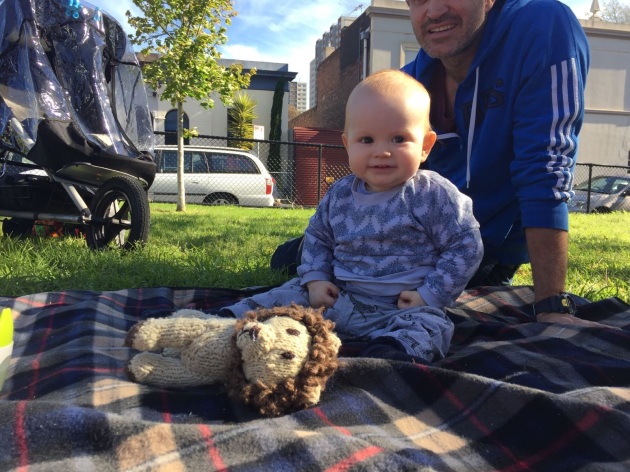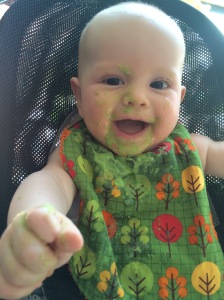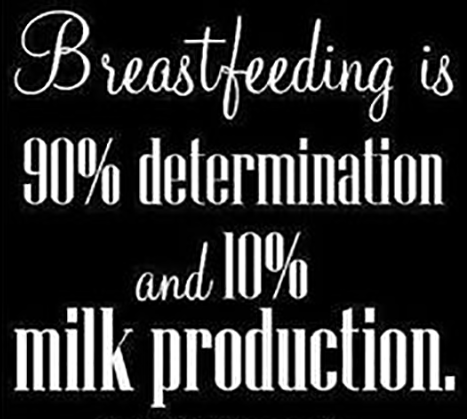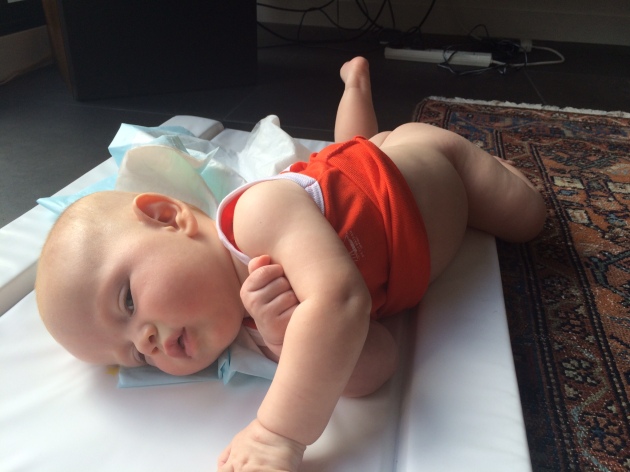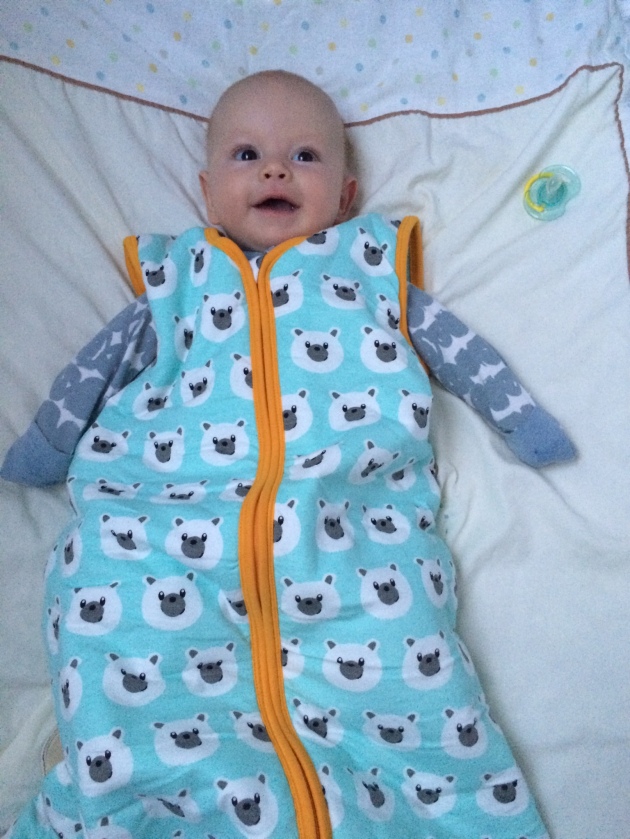
Lionel modelling his range of boyswear
I honestly believe that. It’s the best thing about being a man. In fact, I’ve always thought that the best thing about being a man was the toilet deal. Whenever I’m at an event – or any public space – and I need to wee I celebrate my masculinity. It’s true, sometimes you get pissed on – usually by yourself – but the shorter queues and relative ease of the sneaky behind the tree option more than makes up for that.
Until quite recently, that was probably the sum total of my entire life’s thinking on the subject of going to the toilet. A quite impressive body of work.
But then there’s this baffling transgender bathroom debate in the medja again over the weekend. President Trump has revoked guidelines that instructed public schools to let kids use the bathroom that matches their gender identity (i.e, kids born as boys but who identify as girls can go to the girls toilets).
I guess it’s baffling because I wasn’t aware the problem existed. And it had the stench of a bullshit culture war issue; it wasn’t a thing until someone made it a thing, but now that it is a thing, it’s quite a big thing.
For what it’s worth, I think existing laws are adequate to deal with people who go into bathrooms to do nefarious things, and I’ve never heard a woman complain about men dressed up as women hanging around in their bathrooms. But if people felt licensed to start looking, or even policing for this, then it would probably end up badly for genuine transgendered people.
I say genuine because I admit to not fully understanding what transgenderism is even after looking into it some. I thought I had something of a handle on sex and gender. At university, feminists – and there were different kinds: liberal, radical, socialist, etc. – taught me that gender was “problematic” (I remember first hearing the word problematic and being very impressed; some things had problems, but some things had problems that were also -matic). It was problematic because gender roles were imposed externally by the patriarchy which meant that women got the shittier deal. Justice demanded less rigid definitions of these roles and now I have to look after a baby.
Now we can argue about how well all this is working, but in our societies it’s fairly mainstream to regard the distinction between biological sex and gender as useful. Sex is fixed, but gender – the cultural expression of sex – is a bit more dynamic. I’m not saying that sex and gender are independent of each other — they’re plainly not. But it’s clear that the social meaning of man and women changes even if our bodies do not.
Lots of people find their gender more or less limiting, but there were always a small number of people who found living in their gendered body intolerable or dysphoric. Some of these people would “transition” to the opposite gender, sometimes even having medical treatment to make their bodies resemble the opposite sex. This process can be rough, but if someone, say, a man, goes through this transition and then presents as a woman, then it’s decent and respectful to treat that person as a woman. No dramas, everybody lives.
We used to call the people who did this “transsexuals” and I thought, until recently, that transgender meant more or less the same thing. But transgender, I learn, is a much broader term, covering all sorts of non-conforming “gender identities”. It’s hard to get a comprehensive definition and I admit that not everything I’ve read about it is coherent for me.
I do know that transgenderism makes some feminists very angry, which I found interesting. It seems to turn on what the “transition” to a woman involves. So, if you’re a man, you can’t just one day say, “I identify as a woman” and therefore be a woman, even though you still present like a man. This is because being a woman is an experiential category: to be a woman, you have to experience the social reality of being a woman. Transgender activists call these people TERFs (Trans Exclusionary Radical Feminist).
I think I will stay out of that argument. On the face of it, it seems a bit rigid. If someone presents as a woman I will address them as a woman. On the other had, I don’t buy the idea that gender is a spectrum, with lots of different gender identities you can choose from in between male and female, as some have claimed. That doesn’t mean that I don’t think there aren’t people who struggle to inhabit either male or female identities, and I don’t think all of these people are just trying to be edgy and cool. Some of them are, of course; that’s just being young. We were all doing it at university, though the focus of our rebellion was more about sexual orientation.
I guess my point is, if the motivation for a non-binary gender identity is primarily political – to challenge gender norms – then my instinct would be to take a conservative position: keep gender binary — it works well — and manage the consequences of its exclusions compassionately. Life is already confusing enough.
I doubt that “smashing the binary” is what the majority of transgender people are all about. I’m open to learning more, and especially having it explained what the difference is between all these gender identities I’ve heard about and some other category like, say, personality. So what I’m saying is that I don’t fully understand the difference between “gender”, “gender expression”, and “gender identity”.
Anyway, I don’t really have to take a strong position on any of this. Lionel is a boy. That seems clear enough. He is only fifteen months but I dress him like a boy – mostly – and reinforce his boyness daily by the way I talk, play and handle him (quite roughly). I want him to keep his feelings to himself and respond to difficult situations with unprincipled aggression.
If someone told me that male was just the gender he was “assigned” at birth, I’d probably role my eyes. He was born a boy and will almost certainly express his gender, give or take, much like a boy. That’s just math.
I know the world is changing – more children under ten are experiencing gender dysphoria and it’s not clear why – but there’s still only a tiny chance that he’ll identify as a girl. If he does – I don’t just mean wanting to wear dresses, etc. – then I’ll have to think a bit harder about everything.
Most of what I know about this is from a Louis Theroux documentary, Transgender Kids. I love Louis Theroux’s films. What he sells is irresistible for people like me: the warm feeling of open-mindedness.
Theroux interviews little kids experiencing gender dysphoria -feeling you’re a male even though your biological sex is female (or vice versa). But it’s the parents who seem to be having the real shocker. Some of the parents are grappling with a dilemma: do they start hormone blockers – drugs that delay puberty – or wait and see. If they wait and see, their kid might revert to their birth gender and everything is fine. But if the gender dysphoria remains, they risk going through puberty with the “wrong” body and then, I guess, the longer you wait to transition, the harder it is.
Before seeing this film, I would have said that medical intervention into prepubescent children experiencing gender dysphoria is an appalling idea. I didn’t even know these things existed. But walk a mile in these parents’ shoes.
I’m also guessing lots of adult transgender men or women probably wished they’d had the chance to transition when they were younger.
I remain in the cautious camp – we don’t know enough about the drugs or the condition of gender dysphoria in kids to make good decisions. But I guess it would have to happen to you personally to really have an informed view. I do recommend watching the documentary.











